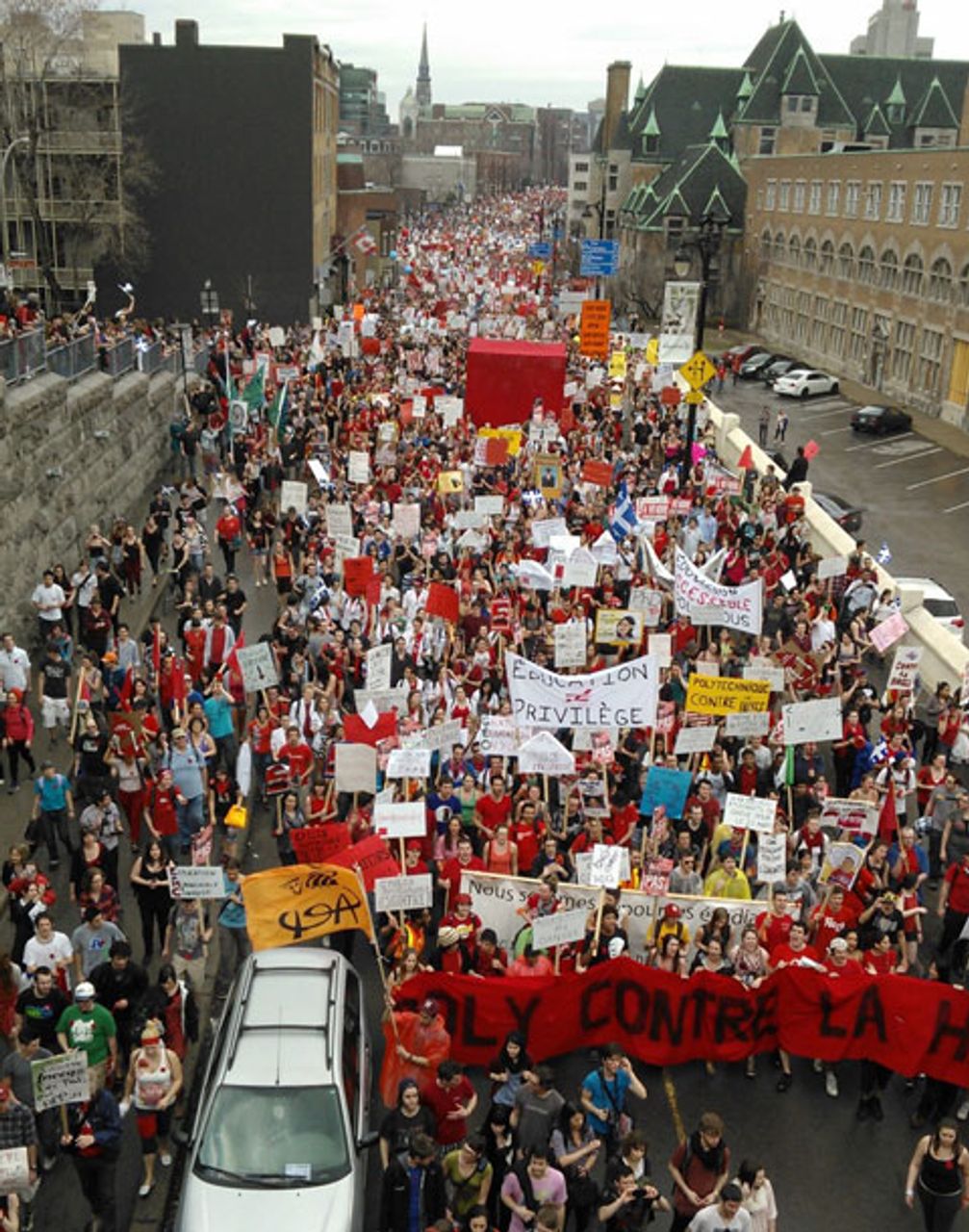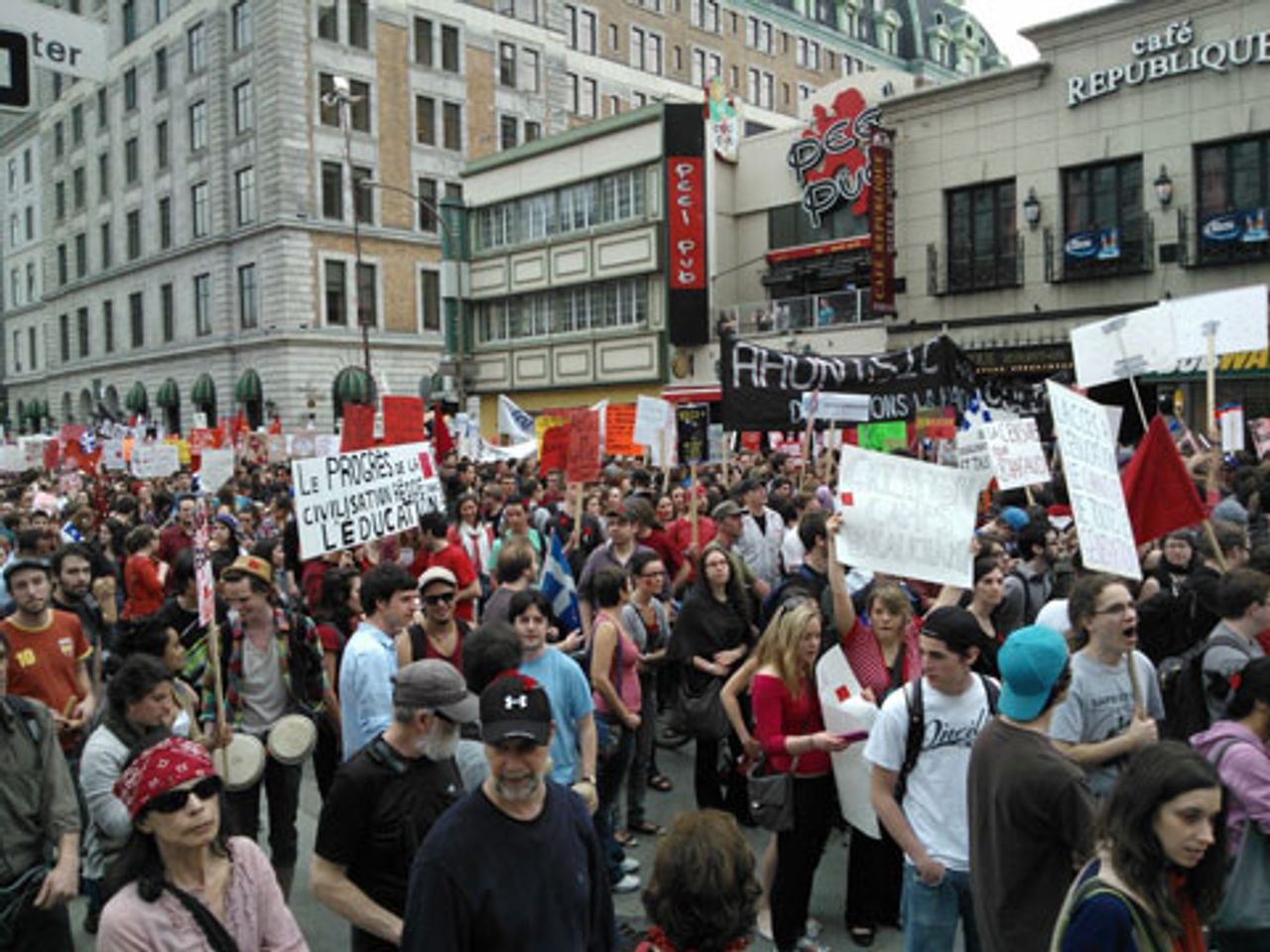Two hundred thousand people took to the streets of downtown Montreal Thursday to demand that the Quebec Liberal government rescind its plan to raise university tuition fees by 75 percent over the next five years.
 Thursday's demonstration against the provincial Liberal government's plan to raise university tuitions by 75 percent over next five years was one of the largest in the history of Montreal.
Thursday's demonstration against the provincial Liberal government's plan to raise university tuitions by 75 percent over next five years was one of the largest in the history of Montreal. The vast majority of the demonstrators were striking university and CEGEP (pre-university and technical college) students. Many of them had traveled to Montreal from Quebec City, Sherbrooke, Gatineau, and other smaller cities and towns across Quebec. But there were also significant numbers of high school students and CEGEP and university teachers, as well as many individual workers and retirees. Several, admittedly small, delegations of workers—including nurses, construction workers, and provincial civil servants—joined the protest march.
Thursday’s demonstration was among the largest ever held in Montreal, equaling if not surpassing the massive protests held immediately prior to the US invasion of Iraq in March 2003. At one point the crowd stretched for nearly five kilometers, with almost everyone wearing something in red, the colour which has come to symbolize the anti-tuition hike movement.
 A section of the march
A section of the marchAmong the demonstrators there was much anger and indignation at the government’s intransigence. Less than 48 hours before the protest began, the Liberal government of Jean Charest presented a budget that reaffirmed and expanded its austerity program of social spending cuts, regressive tax and user-fee hikes, university tuition fee increases, and electricity rate rises.
But Thursday’s protest also had a festive air as the sheer scale of the crowd and its representative character became evident.
Many of the demonstrators bore handmade signs. Most denounced the government of Premier Jean Charest and/or asserted that education should be a right, by definition open to all. “Education is a right, so why pay for it,” read one sign. “Students aren’t clients,” proclaimed another. A third, “Education is a common good”. The placards also made frequent reference to the revolutions in Egypt and Tunisia, including “The student Spring” and “Printemps érable” (Maple Spring).
Thursday’s demonstration came after weeks of a mounting province-wide student strike. On Thursday an estimated 300,000 students, including for the first time many high school students, boycotted classes. And well over 200,000 of them—considerably more than half of all Quebec’s post-secondary students—remain on strike.
As the demonstrators gathered in downtown Montreal late Thursday morning, Premier Charest reiterated that his government will not repeal or brook any changes to its plan to raise university tuition fees by $325 per year. “Hopefully,” added the premier, “those who choose to express themselves today will do it peacefully and respectfully.”
This was a calculated slur. From the beginning of the strike movement last month, the government has sought to paint the students as violent. In reality it is the police, following the orders of their political masters, who have provocatively intervened at student protests, using pepper spray, sound-grenades, and baton charges to disperse demonstrators. Earlier this week, police issued close to a hundred striking students $494 traffic tickets for blocking access to the Champlain Bridge, which connects Montreal Island with the South Shore, for an hour.
Within the Quebec and Canadian elite there is overwhelming support for Charest’s hardline stance against the student strike, including the government’s refusal to even meet with leaders of the three main student associations.
The corporate media has churned out reams of editorials and commentary denouncing the students as “selfish” and “utopian.” Under conditions where big business is seeking to gut public services, including pensions and health care, the ruling elite is incensed by the students’ insistence that education is a right. Moreover, big business recognizes that the student strike is an implicit challenge to the austerity policies being implemented by governments at all levels and of every political stripe across Canada.
In an op-ed column Friday in La presse, Quebec’s most influential newspaper, its former editor, Alain Dubuc, underlined the importance that the ruling class attaches to prevailing over the students. Dubuc concluded his list of the “principled” reasons for the Liberals’ running roughshod over popular opinion so as to dramatically raise tuition fees, by declaring, “There was another principal at stake … it’s that of breaking a mold, that of the attachment to the status quo. It’s as if the youth had fallen in the holy water of the Quebec model [of an expansive welfare state] and had taken up from their elders the defence of acquired rights.”
While the government and ruling elite base their strategy on a clear recognition of the connection between the university tuition fee hikes and their overall drive to destroy what remains of the social gains that the working class won through the social struggles of the last century, the leadership of the strike movement is deliberately confining it to a single issue protest and adamantly opposed to making it the catalyst for a working-class counter-offensive.
The two trade union-supported student associations—the Quebec Federation of University Students (FEUQ) and the Quebec Federation of College Students (FECQ)—held a joint press conference Thursday morning with Pauline Marois, the head of the big business Parti Quebecois (PQ) and leader of the official opposition in Quebec’s National Assembly.
Marois claims to support the students’ cause, calling for the government to drop its fee hike plan. But this is patently pre-electoral political posturing. Marois has not ruled out a PQ government introducing its own program of tuition fee hikes, after convening a forum or summit meeting to discuss the issue of university financing. Even more significant was the PQ’s condemnation of Tuesday’s budget for not cutting social spending fast or deep enough.
Also present at Thursday’s press conference were the co-leaders of the ostensibly “left” Quebec Solidaire, the leader and sole legislator for Option Nationale, a PQ split-off, and the heads of Quebec’s three main trade union federations. The unions, it should be recalled, played a major role in short-circuiting the last major student strike in 2005. They offered their organizational support to the students, then prevailed on them to “compromise” with the government so as to uphold “social peace.”
There is no question but that the FEUQ and FECQ leaders, to say nothing of the PQ and their trade union bureaucrat allies, are anxious to see the current strike movement brought to a quick end. On Friday, FEUQ and FECQ announced a campaign of protests targeting Liberal MNAs (Members of the National Assembly) who were elected by only a narrow margin. They clearly intend to point to the Liberals’ intransigence to argue that the strike has exhausted its usefulness and that the way forward is to “punish the government at the ballot box.”
But they also fear the consequences of being openly perceived as opposed to the continuation of the strike. Speaking like a trade union bureaucrat in training, FECQ president Léo Bureau-Blouin pleaded Friday for negotiations with the government, “At a certain point, it’s going to become a veritable social crisis,” said Bureau-Blouin. “People will demonstrate every day. They’re going to disturb MNAs’ offices and I will no longer have any control.”
CLASSE [“The Broader Coalition of the Association for Student-Union Solidarity”], the student association which initiated the strike movement, opposes FECQ’s and FUCQ’s alliance with the PQ. But its perspective is entirely within the framework of a protest politics that accepts the current political framework and the immutability of the capitalist social order. Speaking at the conclusion of Thursday’s mammoth protest, CLASSE’s principal spokesman, Gabriel Nadeau-Dubois, declared, “To make the government move, it will be necessary to disrupt, to occupy. It will be necessary to stir things up in Quebec.”
CLASSE is to determine at a conference this weekend its strategy in the wake of the Liberal budget and Thursday’s march. But everything indicates it will choose to broaden its campaign of blocking bridges and transport so as to “disrupt” the economy.
What CLASSE opposes is a turn to the working class—the one force that has the social power to oppose the subordination of all social-economic life to big business’ profits and whose fundamental interests lie in the fight for social equality and the preservation and extension of social rights.
Undoubtedly the young people who are rallying behind CLASSE’s “economic disruption” campaign, despite the very real threat of police violence, are exhibiting commendable courage and self-sacrifice. But in the absence of a perspective for mobilizing the working class in political and industrial action against the austerity programs of the Charest and federal governments and in defence of jobs, such actions will prove to be a blind alley.
Supporters of the International Students for Social Equality and the Socialist Equality Party distributed more than 2,000 copies of a brochure Thursday containing a statement “Students must turn to the working class” and a critique of the politics of CLASSE, “Protest is not enough: the need for a new strategy.”
This author also recommends:
Quebec’s striking students must turn to the working class!
[29 February 2012]
Receive news updates and information on the fight against the unsafe reopening of schools.
